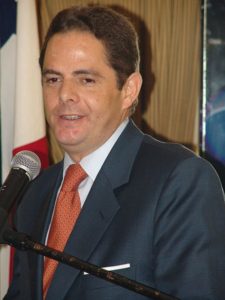Colombian Vice President Resigns to Pursue Presidential Aspirations
The Colombian Senate accepted former-Vice President Germán Vargas Lleras’ resignation by a 76 to 0 vote on March 21, freeing him to begin his campaign for president in the 2018 election. Vargas Lleras has not explicitly announced his candidacy yet. However, he revealed his intention to resign in January 2017, and the media and public have long assumed that he aims to run for the presidency. His letter of resignation, according to Semana, stated, “I have not defined my participation in the next electoral process,” but justified his resignation “given the possibility” of a presidential run.
Colombian law does not allow the citizen who serves as vice president in the year before the election to run for president. The first round of voting for the 2018 election will be held on May 25, but Vargas Lleras eliminated the possibility of senatorial opposition by announcing his resignation two months early.

President Juan Manuel Santos, who will not run in the 2018 election, named Óscar Naranjo, a former general and national chief of police, to succeed Vargas Lleras. In a speech announcing his choice, Santos indicated that Naranjo will help lead the government’s fight against illegal coca production and violent criminal organizations.
Assuming Vargas Lleras runs for office, he must decide which political party he will represent. His party, the Radical Change, currently governs in coalition with Santos’ Social Party of National Unity, known as “the U,” and the Liberal Party. However, in a congressional plenary session on Vargas Lleras’ resignation, Senator Armando Benedetti, a party leader of the U, hinted at his opposition to Vargas Lleras’ candidacy.
Humberto de la Calle, the Santos administration’s chief negotiator in its peace agreement with the FARC guerillas, is another prospective 2018 presidential candidate. Although de la Calle has not yet announced his candidacy, he has made obvious criticisms of Vargas Lleras in recent public appearances. De la Calle’s remarks serve as indicators to many of an attempt to differentiate himself from potential opponents ahead of a presidential run.
Óscar Iván Zuluaga of the Democratic Center, the current opposition party, withdrew from the campaign in early March 2017 after accusations of his involvement in the Odebrecht bribery scandal.
Though Vargas Lleras has made many enemies during his tenure as vice president, El Tiempo reports that he leads many opinion polls of prospective 2018 candidates.
